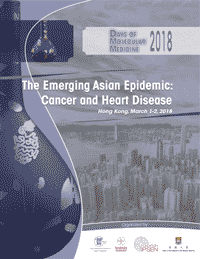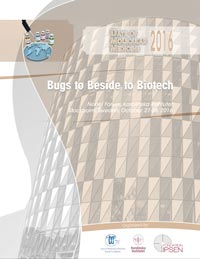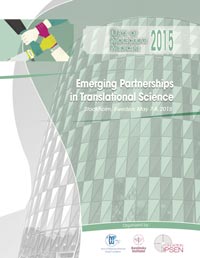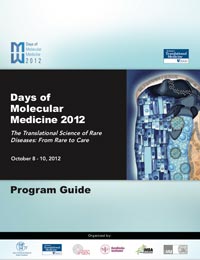The Foundation is organized along two focal points, the DMMGF Conference Network and the DMMGF Global Health Initiative.
DMM Global Conference Network
The DMMGF Conference Network is a collection of international scientific research meetings. Our meetings focus on advances in molecular medicine and biotechnology. We aim to apply those advances to unmet clinical needs. DMM is our international, large-scale flagship meeting. Each year highlights recent advances in a specific, emerging area of translational science.
The Boston Biotechnology Network (BBN) series is an open, small scale meeting. We choose speakers from a pool of leading clinicians, physician-scientists, and research scientists. Each meeting features three Boston based speakers. Participants discuss new therapeutics strategies, paradigms, and agents for rare and common diseases.
Days of Molecular Medicine (DMM)
Over the past 17 years, the Days of Molecular Medicine (DMM) has become one of the most prestigious international meetings dedicated to promoting translational science and molecular medicine. The meeting was initiated with the vision that medical research is the key to further understanding human biology and disease, which has increasingly become enabled by major leaps in core technology spanning the field of genetics, imaging, stem cell biology, and biotechnology. The meeting is designed to break new ground in a specific arena that is viewed as being timely as well as critical to translational science at the highest level, and is not intended to highlight a single disease area or technology. A particular aim of the meeting is to offer scholarships to the most promising young physician-scientists in training, in order to inspire and encourage their scientific career paths in translational science and medicine.
Over the past 17 years, the DMM meeting has been co-organized with multiple partners, including the American Association for the Advancement of Science (AAAS), and their associated journals, Science and Science Translational Medicine, the Karolinska Institutet, Hong Kong University, and the Foundation IPSEN. Each year, the meeting is held at an international site.
Here are some of the recent DMM meetings organized through DMMGF:
-
Emerging Asian Epidemic of Cancer and Heart Disease Hong Kong — March 1–2 2018
-
Bugs to Bedside to Biotech Stockholm, Sweden — October 27–28, 2016
-
Partnerships in Translational Science and Medicine Stockholm, Sweden — May 7–8, 2015
-
From Rare to Care Vienna, Austria — October 8–10, 2012
-
Re-engineering regenerative medicine Hong Kong, China — November 10–12, 2011
Boston Biotechnology Network Meetings
The Boston Biotechnologies Meetings are designed to highlight recent advances in translational science and medicine in the Boston area, and to share these results with the public at large. The meetings are usually small, involving less than 20 participants. These one-day meetings are held annually, are open to the public, and feature leading physicians and scientists from Harvard, MGH, Boston Children's Hospital, MIT, and other leading area institutions.
 View Program [8.6MB PDF]
View Program [8.6MB PDF] View Program [2.4MB PDF]
View Program [2.4MB PDF] View Program [3.6MB PDF]
View Program [3.6MB PDF] View Program [4.7MB PDF]
View Program [4.7MB PDF] The Children’s Cardiovascular Health Program was created as a response upon visiting institutions around the world, both in medicine and academia, and realizing the vast number of children and adolescents in developing nations with unique and rare cardiovascular diseases, including the regions of Africa and Asia. The DMM Global Foundation understands that this is a complex problem, given the pressing demands for the immediate clinical care of patients, as well as problems related to the availability and affordability of the medical treatment.
The Children’s Cardiovascular Health Program was created as a response upon visiting institutions around the world, both in medicine and academia, and realizing the vast number of children and adolescents in developing nations with unique and rare cardiovascular diseases, including the regions of Africa and Asia. The DMM Global Foundation understands that this is a complex problem, given the pressing demands for the immediate clinical care of patients, as well as problems related to the availability and affordability of the medical treatment.
 DMMGF understands the need to further address the need for scientific advances in womens reproductive health, in particular endometriosis, and women’s mental health especially during the post-partum period. This program aims to look at the entire spectrum of mental and physical difficulties that women face during the major life transition of trying to get pregnant to the post-partum setting. While a great deal of research has been directed towards the health and well-being of the newborn, there has been less work and discussion on the maternal challenges that are presented immediately in the post-natal period.
DMMGF understands the need to further address the need for scientific advances in womens reproductive health, in particular endometriosis, and women’s mental health especially during the post-partum period. This program aims to look at the entire spectrum of mental and physical difficulties that women face during the major life transition of trying to get pregnant to the post-partum setting. While a great deal of research has been directed towards the health and well-being of the newborn, there has been less work and discussion on the maternal challenges that are presented immediately in the post-natal period.